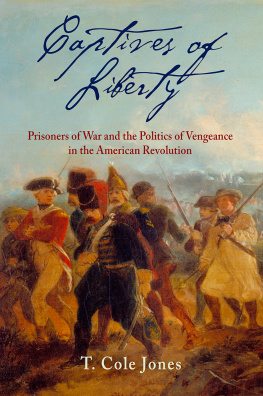Jean Lorrah - Captives
Here you can read online Jean Lorrah - Captives full text of the book (entire story) in english for free. Download pdf and epub, get meaning, cover and reviews about this ebook. genre: Romance novel. Description of the work, (preface) as well as reviews are available. Best literature library LitArk.com created for fans of good reading and offers a wide selection of genres:
Romance novel
Science fiction
Adventure
Detective
Science
History
Home and family
Prose
Art
Politics
Computer
Non-fiction
Religion
Business
Children
Humor
Choose a favorite category and find really read worthwhile books. Enjoy immersion in the world of imagination, feel the emotions of the characters or learn something new for yourself, make an fascinating discovery.
- Book:Captives
- Author:
- Genre:
- Rating:5 / 5
- Favourites:Add to favourites
- Your mark:
- 100
- 1
- 2
- 3
- 4
- 5
Captives: summary, description and annotation
We offer to read an annotation, description, summary or preface (depends on what the author of the book "Captives" wrote himself). If you haven't found the necessary information about the book — write in the comments, we will try to find it.
Captives — read online for free the complete book (whole text) full work
Below is the text of the book, divided by pages. System saving the place of the last page read, allows you to conveniently read the book "Captives" online for free, without having to search again every time where you left off. Put a bookmark, and you can go to the page where you finished reading at any time.
Font size:
Interval:
Bookmark:
Jean Lorrah
Captives
Prologue
THE LEGEND OF THE FIRST READER
Before there was an Aventine Empire the world was broken up into little kingdoms. In one of those kingdoms lived a young man who had the power to Read-to know what was in other people's minds-but he was the very first to have such power, and he did not know what to do with it, so he remained a poor honest laborer.
In this kingdom the king had no sons, but he had one very beautiful daughter; all men who saw her wanted to marry her. Since she did not know how to choose among her many suitors, she declared a contest: Whoever could give her her heart's desire would have her hand.
So men brought her gold and jewels, fine horses, musicians and dancers to entertain her, perfumes and spices-and always she declared that their gifts were not her heart's desire.
The young Reader, though, was able to Read what was going on in the princess' mind as her suitors displayed their treasures and were rejected. The king grew angrier and angrier as the girl refused one after another of the fine, strong, wealthy men. The Reader knew that the king wanted his daughter to marry a king but the daughter did not like the powerful men who tried to claim her hand.
Watching the princess each time there was a public ceremony for another suitor, and Reading her true desire, the Reader fell deeply in love with her. At length, despite the fact that he was a common laborer with no property to give her, he decided to risk pressing his suit. When he stepped forward, the people laughed to see a poor man with no troop of servants carrying treasures, marching forward empty-handed to the foot of the throne.
The king, however, was curious enough to allow the Reader to offer his gift. The young man drew himself up, and addressed the princess. "All your life," he said, "you have had gold and jewels, slaves, furs and perfumes, horses and falcons, treasures from all the lands of the world. All these your father can provide for you-yet you say you do not have your heart's desire. Thus it cannot be any worldly treasure that you long for. What you desire is the love of a good man-a man who is not bent on accumulating treasure or making war on his enemies-a man who will place you above all things as the greatest treasure of his heart. This I can give you, as no man else."
Never before had the princess met a man who understood her deepest desires. "Yes!" she cried. "That is my heart's desire! I shall love you above all men!"
But the king, who had thought the young man comical until his daughter's response, was maddened with anger. "You lie!" he roared. "No daughter of mine would be so foolish as to forego power and wealth for such frivolity! You are a liar, young man, and will die for daring to say such a thing about a member of the king's family! And you," he added, turning to his daughter, "will deny what he has said, or I will have you killed, too!"
"But I can prove it!" cried the young Reader. "I can tell you what is in your heart-I can hear any man's thoughts! You are thinking that you want a strong and powerful man to marry your daughter and be king after you-someone who will give her strong sons who will capture many lands and accumulate great treasures. But if you could Read what was in her heart, you would know as I do that these things mean nothing to her."
Now the king knew that the Reader spoke the truth about what he was thinking, but he also thought it nothing but common sense, such as any man ought to think. He had the young man hauled off to the dungeon, threatening to cut his tongue out if he continued to tell lies about the princess. That night, however, another suitor for the princess' hand arrived-a great and powerful warlord from a neighboring land.
Languishing in his dungeon, the Reader Read the plans of the warlord. He had brought with him an army, claiming it was his gift to the princess, for surely it must be strength of arms that was her heart's desire. But he was also prepared for rejection-in which case his army, thus smuggled into the heart of the kingdom, would turn on the people. They would kill the king, and the warlord would take the princess by force and make himself king of all the land.
Knowing this, the Reader begged and pleaded with his guards to arrange an audience for him with the king. As it happened, the king had planned to test the young man's claims, for he could see great value in someone who could tell him his enemies' secrets if such an impossible claim proved true. So the next morning he had the Reader brought before him, and the Reader told him the plan of the warlord. The king had his own army, disguised as common people, surrounding the warlord's army when he made his offer to-the princess. She rejected him, of course-and he turned and shouted to his men, "To arms!"
Just as quickly, the king's men threw off their disguises, and in a battle at the king's feet they slaughtered their enemies. The Reader was elated-he had proved his value, and was sure the king would change his mind and allow him to marry the princess.
But the king saw only danger in a man who knew what was in people's minds-he immediately envisioned his son-in-law plotting to kill him and take the throne, and no reassurances would make him trust the Reader, nor would the pleadings of the princess mitigate his decision.
He knew, of course, that the Reader was a double-edged sword: If he did not like the way the king treated him, he might run away to work against him with one of his enemies. Therefore he had the young man hamstrung, so he could not run away, and he tortured him to force him to Read for him.
In less than a year the king had conquered all the neighboring lands. He always knew the size of the enemies' armies, where they were located, all the battle plans. He also captured the fine, strong, warrior son of one of his enemies-a man who saw opportunity in ingratiating himself with a king he could not conquer. Soon plans were underway to marry the princess to the warrior-for she had learned well the lesson her father had taught her. The Reader might have been willing to give her her heart's desire, but he had not the strength to win her and then protect her. So she gave up her desire for someone to love her in exchange for someone who would be very much like her father, shower her with presents, and protect her against her enemies.
On the eve of the wedding, while the bridegroom and his prospective son-in-law were drinking themselves into a stupor with the wedding guests, the Reader was of course left alone in his room in the castle-what need to chain him in the dungeon once he was lamed? The treatment he had received for revealing his gift had worked on his mind in the past year-and he had learned to walk again, if with a hideous limp. When the revelers were thoroughly drunk, he set fire to the castle, went to the room where the princess lay guarded only by women, whom he killed, and carried the girl off into the night.
In the morning, the king and his would-be son-in-law were found dead, along with most of their guests. The princess was found in the woods nearby-she claimed to have been raped by the Reader, and nine months later she bore a son.
The princess ruled the land as her father had before her, for she had his army and she knew his methods. Her son turned out to be a Reader like his father and it is said that all the Readers of what would become the Aventine Empire are descended from him. His father, however, disappeared without a trace. Here and there were heard tales of a strange lame man who could tell people's most secret thoughts, but no warlord ever held him again, and no one knows what finally became of him. Perhaps, bitter and disillusioned at the fate of his offer of true love, he is wandering still.
Chapter One
Where do I belong? What should I be doing with my life? Certainly not healing!
Font size:
Interval:
Bookmark:
Similar books «Captives»
Look at similar books to Captives. We have selected literature similar in name and meaning in the hope of providing readers with more options to find new, interesting, not yet read works.
Discussion, reviews of the book Captives and just readers' own opinions. Leave your comments, write what you think about the work, its meaning or the main characters. Specify what exactly you liked and what you didn't like, and why you think so.








